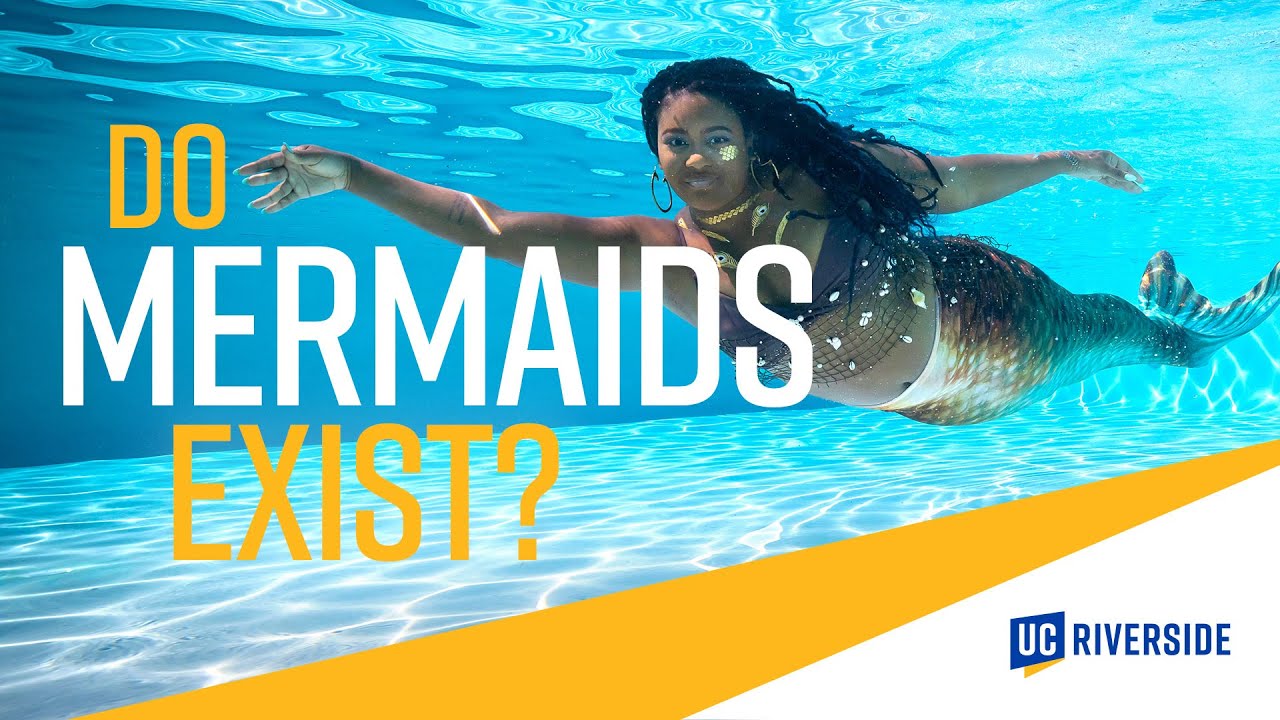At UC Riverside, Jalondra Davis is an assistant professor of English. In her “The Merwomanist” podcast, she is Mami Melusine. Under the water, she is a mermaid.
For Davis, the connection with water and mermaids runs deeper than a childhood fantasy tale. She has been intrigued by mermaids since she was 5. She learned about sirens in Homer’s “Odyssey,” and watched the film “Splash.” She watched Disney’s “The Little Mermaid” dozens of times with her little sister, who was obsessed with wearing Ariel’s red hair as a wig and a dress with white sheer sleeves that covered her chocolate skin.
Throughout her teens, and then in college, Davis discovered the important — and many times intentionally omitted — historical connections between Black people and water. At UCR she, researches the intersections of Black studies, women and gender and sexuality studies, and contemporary fiction and popular culture. With the upcoming release of Disney’s live-action “The Little Mermaid,” Davis’ research is more relevant than ever. The film features singer, songwriter, and actress Halle Bailey as Ariel, Disney’s first Black Ariel protagonist.
Fantasy does not exclusively belong to the imaginations of white European writers and creators, Davis, ’17, said. For Davis, taking factual, historical components and incorporating them into fantasy, is a way to reconcile the African American experience.
“I have always loved mermaids, it’s something I have always identified with,” Davis said. “One of the things I am zeroing in on is this idea of the Middle Passage as the birth of mermaid species. I call this idea crossing merfolk.”
The Middle Passage refers to the enslaved Africans who were inhumanely transported in “slaver” ships to the Americas and Europe across the Atlantic Ocean between the 1500s and the 1800s. They were human property in a “triangle trade,” exchanged for goods and services between Europe, Africa, and the Americas. Estimates indicate that about 15% of Africans died in the grueling 80-day voyage. Many of those bodies were discarded in the ocean, including children and pregnant women.
Africans believed a water spirit watched over these souls, carrying them into the afterlife, Davis said.
“Many people believe there is too much trauma, too much painful history in the representation of Black people in popular culture,” said Davis, whose upcoming book analyzes the appearances of mermaids, water spirits, and other aquatic beings in African diasporic literature, art, and popular culture. At UCR she has spent many hours using the Eaton Collection of Science Fiction and Fantasy to research this topic. “The intersection of merfolk and the Middle Passage provides a way to continue bearing witness to this history while also experiencing some healing.”
Having a leading Black character in “The Little Mermaid” is a step in the right direction, she said.
“Representation is not everything, but it does matter. It matters for the kids, it matters for little Black girls who can see themselves on the screen. I loved Disney growing up, I loved princesses, I loved fairy tales. Even though there are more options for heroines now, I would have loved to see more fairy tale and fantasy characters that looked like me when I was a child. Had I seen a Black Ariel then, it might have changed what I saw as possible in my life.”
In popular culture, Black mermaids have appeared in music videos, characterizations made by artists such as Sade Adu, Beyoncé, and Nicki Minaj. Most recently, Black mermaids appeared in the Freedom series “Siren” and Netflix series “Invisible City” and “Wednesday.”
Denoting the spiritual and cultural significance of Black mermaids is one of the central conversations Davis brings about in her “The Merwomanist” podcast, a project she started recording in her home’s closet a year ago.
Black mermaids are embedded in African diasporic history, Davis said. They originate in African cosmology, thousands of years ago, meant to honor the sacred nature of water. Among those revered is a water goddess known as Mami Wata. When it comes to children’s storybooks, Davis recalls first seeing a Black mermaid in “Sukey and the Mermaid” written by Robert D. San Souci and illustrated by Brian Pinkney. The mermaid is Mama Jo, a character derived from a South Carolina folktale. Mama Jo is considered the African American version of Mami Wata.
In the first “The Merwomanist” podcast she introduces herself as Mami Melusine and discusses Black mermaid origins. Contrary to popular belief and the Euro-centered mythology, Black history has always included its own mythology, Africans and African Americans have also created imaginary worlds, Davis said.
“Black mermaid stories often contain so much else. Not all of it, but a lot of Black mermaid lore is anchored within African cosmologies, African religions, African indigenous religions, and spirituality,” Davis said.
Carrying this ancestral connection, becoming a mother, and her passion for mermaids, let her to take on one of the greatest challenges of her life: learning to swim with a monofin and tail alongside a mermaid pod. She is part of an Afro Mermaid pod, which gathers at the annual AfroMermaid summit led by Carrie Wata, a Black professional mermaid based in Florida.
Davis also trained with Mermaid Tiva, a swim coach, lifeguard, and founder of Mermaid at Any Age, a Los Angeles-based organization aimed at teaching more African Americans to swim. According to USA Swimming, about 70% of Black Americans cannot swim, the effects of segregation and racism in this country.
“My passion for this research comes from the fact that I have always loved mermaids, I love water, and have always seen the ocean as very spiritual,” Davis said. “There is nothing more massive, more powerful, more potentially destructive than the ocean. I felt the project was calling me.”
"creation" - Google News
May 08, 2023 at 08:35PM
https://ift.tt/UHbcvEL
Black mermaids, a creation of fact and fiction - UC Riverside
"creation" - Google News
https://ift.tt/s0BNAUK
https://ift.tt/r2mCXsk
Bagikan Berita Ini















0 Response to "Black mermaids, a creation of fact and fiction - UC Riverside"
Post a Comment